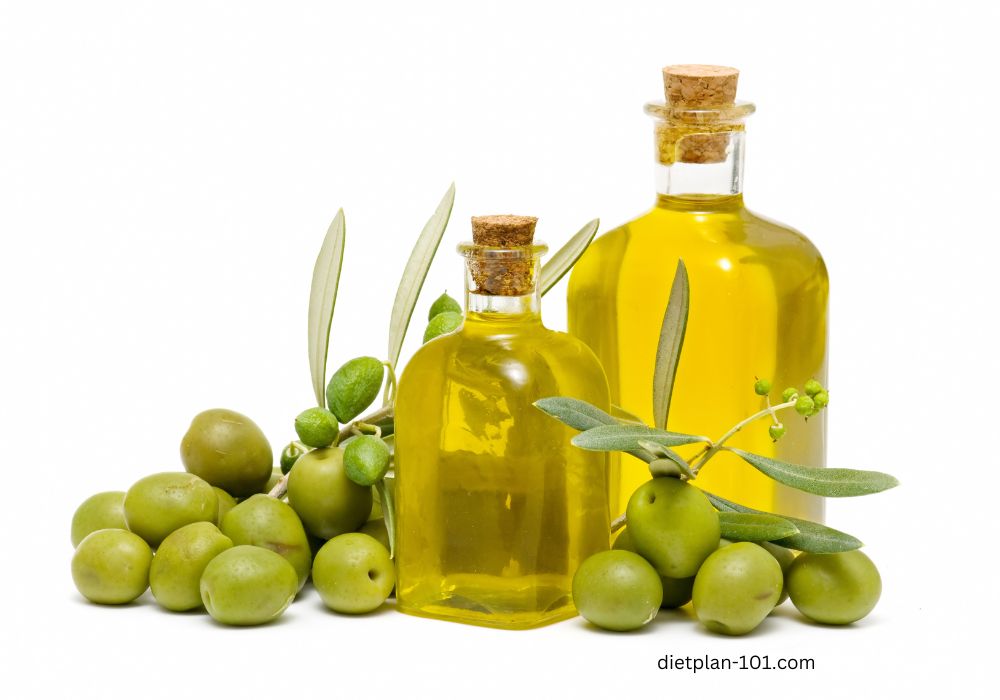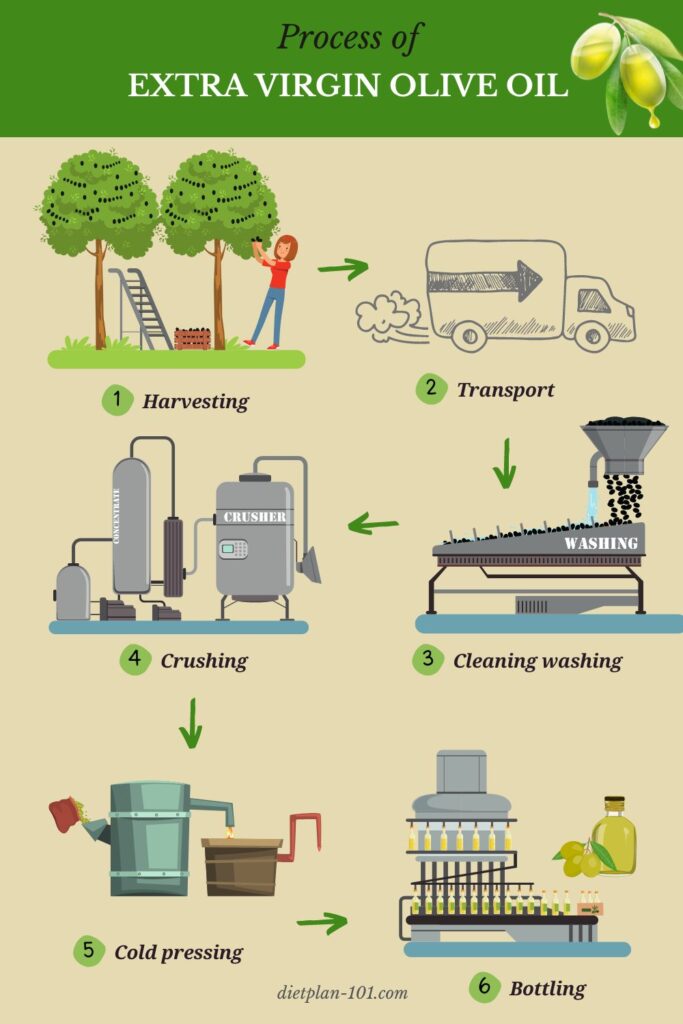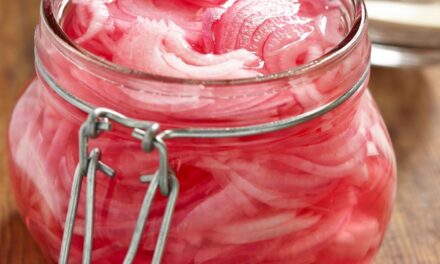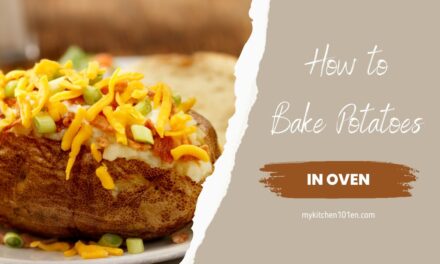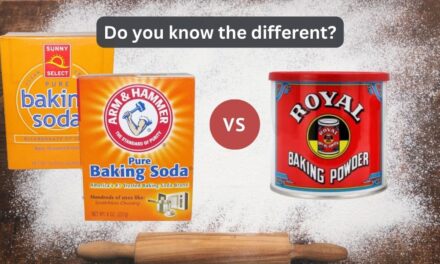Table of Contents
Extra virgin olive oil (EVOO) is a staple ingredient in many kitchens around the world. Praised for its health benefits and superior taste, EVOO has earned a special place in the hearts and pantries of food enthusiasts.
But what exactly is extra virgin olive oil, and how is it different from other types of olive oil?
Learn all about the health benefits it provides, its distinct taste, and when it should best be used.
Different Types of Olive Oil
Olive oil is produced by pressing olives, the fruit of the Olea europaea tree, which is native to the Mediterranean region. There are several grades of olive oil, each with its own characteristics, production methods, and uses:
- Extra Virgin Olive Oil (EVOO)
- Virgin Olive Oil
- Refined Olive Oil
- Olive Pomace Oil
What is Extra Virgin Olive Oil (EVOO)?
EVOO is the highest grade of olive oil available. It is made from pure, cold-pressed olives, with no heat or chemicals used during extraction. This results in an oil that is rich in flavor, aroma, and nutritional value.
Production: Spain, Italy, and Greece are the world’s largest producers of olive oil, with Spain alone accounting for around 45% of the global production.
The Production Process of Extra Virgin Olive Oil
The process of making extra virgin olive oil is what sets it apart from other olive oils. There are three key steps in producing EVOO:
- Harvesting: Olives are handpicked or mechanically harvested at optimal ripeness to ensure the highest quality oil.
- Crushing: The olives are crushed into a paste, usually within 24 hours of being harvested to minimize oxidation.
- Cold Pressing: The paste is cold-pressed, meaning no heat or chemicals are used, to extract the oil. This preserves the oil’s natural flavors, aromas, and nutrients.
What are the Benefits of Extra Virgin Olive Oil?
| Benefits of Extra Virgin Olive Oil | Description |
|---|---|
| Rich in Healthy Fats | Extra virgin olive oil is high in monounsaturated fats, specifically oleic acid, which has been associated with reduced inflammation and a lower risk of heart disease. |
| Contains Antioxidants | Extra virgin olive oil is packed with antioxidants, such as polyphenols, vitamin E, and carotenoids, which help protect cells from oxidative stress and may lower the risk of chronic diseases. |
| Anti-Inflammatory Properties | The oleocanthal present in extra virgin olive oil has been shown to have anti-inflammatory effects similar to those of ibuprofen, which may help reduce the risk of chronic inflammation-related diseases. |
| Supports Heart Health | The monounsaturated fats and antioxidants in extra virgin olive oil can help lower LDL (bad) cholesterol levels and maintain HDL (good) cholesterol levels, contributing to better heart health and a reduced risk of cardiovascular diseases. |
| May Reduce the Risk of Stroke | Consuming extra virgin olive oil has been linked to a lower risk of stroke, particularly in older individuals, due to its ability to improve blood vessel function and reduce inflammation. |
| May Aid Weight Loss and Management | The healthy fats in extra virgin olive oil can help promote satiety and regulate appetite, which may assist in weight management and weight loss when consumed as part of a balanced diet. |
| May Help Prevent Type 2 Diabetes | Extra virgin olive oil can help improve insulin sensitivity and regulate blood sugar levels, reducing the risk of developing type 2 diabetes. |
| Supports Brain Health | The healthy fats and antioxidants in extra virgin olive oil have been associated with improved cognitive function, reduced risk of neurodegenerative diseases like Alzheimer’s, and better overall brain health. |
| May Improve Bone Health | Some studies have suggested that the consumption of extra virgin olive oil may help improve bone mineral density and reduce the risk of osteoporosis. |
| Supports Healthy Digestion | Extra virgin olive oil can help stimulate the production of bile and pancreatic enzymes, aiding in digestion and nutrient absorption. |
| Beneficial for Skin and Hair Health | The antioxidants, vitamins, and healthy fats in extra virgin olive oil can help nourish and protect the skin and hair, reducing signs of aging, promoting a healthy complexion, and contributing to stronger, shinier hair. Applying it topically or consuming it as part of a balanced diet can offer these benefits. |
Extra virgin olive oil is packed with health benefits, most notably its high levels of monounsaturated fats, antioxidants, and vitamins.
Studies have shown that regular consumption of extra virgin olive oil can help reduce the risk of heart disease, prevent certain types of cancer, and safeguard against cognitive decline by improving memory and thinking skills.
How Do You Know If It’s True Extra Virgin Olive Oil?
It can be difficult to tell whether a bottle of olive oil is actually extra virgin without looking at the label and reading the ingredients list. Make sure to look for words like “extra virgin” and “cold-pressed” on the label, and look for bottled oils that contain only olives as their source, with no added flavorings or colorings. Additionally, when tasting extra virgin olive oil, it should have a fruity and slightly bitter flavor.
The quality of EVOO is determined by several factors, including:
- Acidity level: EVOO must have an acidity level of less than 0.8% to meet the strict standards set by the International Olive Council.
- Flavor: EVOO should have a well-balanced flavor, with no defects such as mustiness, rancidity, or fustiness.
- Aroma: The aroma of EVOO should be fresh and reminiscent of olives, with no off-putting smells.
What Type of Flavor Does Extra Virgin Olive Oil Have?
Extra Virgin Olive Oil Has a fruity, peppery, and slightly bitter flavor profile.
Extra virgin olive oil has a distinct flavor that can range from buttery and sweet to grassy and peppery, depending on the type of olives that were used to make it.
Additionally, extra virgin olive oil tends to taste a bit more on the tart side than conventional olive oil, thanks to its high levels of phenols.
Also, when tasting extra virgin olive oil, it should have a fruity and slightly bitter flavor.
When Is The Best Time to Use Extra Virgin Olive Oil?
Extra virgin olive oil is best used as a finishing oil, rather than for cooking.
When using extra virgin olive oil, it’s best to drizzle or spread it on top of cooked food at the end of cooking, when the temperature is cooler.
This helps preserve its flavors and natural health benefits. Additionally, you can use extra virgin olive oil as a salad dressing or dipping sauce for breads and vegetables.
Are There Any Other Substitutes for Extra Virgin Olive Oil?
While nothing can fully replicate the taste and natural benefits of extra virgin olive oil, it is possible to substitute other vegetable oils. Grapeseed oil, sunflower oil, avocado oil, safflower oil, and walnut oil are some of the closest substitutes to extra virgin olive oil in terms of nutrition and flavor.
However, these oils don’t have the same distinctive flavor profile as extra virgin olive oil.
Top 10 Frequently Asked Questions About Extra Virgin Olive Oil
1. What is the difference between extra virgin olive oil and regular olive oil?
Extra virgin olive oil (EVOO) is the highest quality of olive oil, made from cold-pressed olives without the use of heat or chemicals. Regular olive oil, also known as refined olive oil, is produced using heat and/or chemicals, resulting in a lower-quality oil with fewer health benefits.
2. How should I store extra virgin olive oil?
Store EVOO in a cool, dark place away from direct sunlight and heat sources. Keep it in an airtight container, preferably dark-colored glass or stainless steel, to prevent oxidation and maintain its flavor and quality.
3. What is the smoke point of extra virgin olive oil?
EVOO has a smoke point between 350°F to 410°F (175°C to 210°C), depending on its quality and acidity level. This makes it suitable for most cooking methods, including sautéing, grilling, and baking, but not ideal for high-heat frying.
4. Can extra virgin olive oil go bad?
Yes, EVOO can go bad over time due to oxidation, exposure to heat, light, or air. It typically has a shelf life of 18 to 24 months when stored properly. If it smells rancid, has a musty or off flavor, or appears thick and sticky, it’s time to replace it.
5. Is extra virgin olive oil good for cooking?
EVOO is suitable for many cooking methods, but its strong flavor and relatively low smoke point make it best suited for low to medium-heat cooking, such as sautéing, roasting, or drizzling over cooked dishes. For high-heat frying, consider using refined olive oil or another oil with a higher smoke point.
6. Is extra virgin olive oil healthier than other types of olive oil?
Yes, EVOO is considered the healthiest type of olive oil due to its high content of monounsaturated fats, antioxidants, and anti-inflammatory compounds. These nutrients contribute to its various health benefits, such as improved heart health, reduced inflammation, and better digestion.
7. Can I use extra virgin olive oil in baking?
Yes, EVOO can be used in baking as a substitute for butter or other oils. It adds a unique, fruity flavor and can help create a moist texture in baked goods. However, its strong taste may not be suitable for all recipes, so consider the desired flavor profile before using it in baking.
8. How can I tell if my extra virgin olive oil is authentic?
Look for certification seals from organizations such as the North American Olive Oil Association (NAOOA) or the European Union’s Protected Designation of Origin (PDO). Check the label for harvest dates, producer information, and acidity levels. Authentic EVOO should have an acidity level below 0.8%. Finally, taste and smell the oil; it should have a fresh, fruity, and slightly bitter or peppery flavor, with no off-odors.
9. Is extra virgin olive oil good for my skin and hair?
EVOO contains healthy fats and antioxidants that can benefit skin and hair health. When applied topically, it can moisturize, soothe, and protect the skin. It can also be used as a natural hair conditioner, promoting shine and reducing frizz.
10. Can I use extra virgin olive oil as a salad dressing?
Absolutely! EVOO is an excellent choice for salad dressings due to its rich, fruity flavor. Combine it with vinegar or lemon juice, herbs, and seasonings for a delicious and healthy salad dressing.

